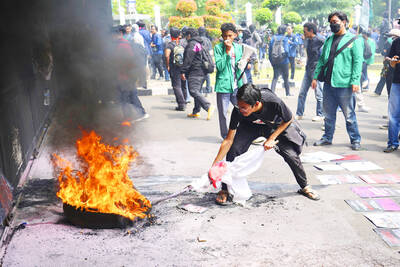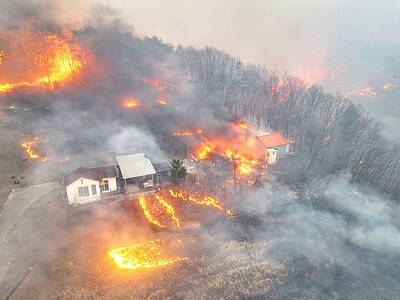As Chinese President Xi Jinping (習近平) gathered leaders from almost all African nations for a summit in Beijing, some former Chinese officials and state media were busy mounting an unusually strong defense of China’s role on the continent.
China has long bristled at accusations that it is solely interested in Africa’s raw materials and that its no-strings-attached approach to loans and aid has only encouraged graft and brought unsustainably high debt.
At the few news conferences during the summit, African reporters peppered Chinese officials with questions about corruption, environmental problems and concerns about a lack of Africans employed in some of China’s projects.
Cheng Tao (程濤), former head of the Chinese Ministry of Foreign Affairs’ Africa division and previously China’s ambassador to Mali and Morocco, said it was unfair to blame China for supporting governments accused of corruption.
“An African friend told me, our government is extremely corrupt. How come you’re still involved with them? Our government has asked the Chinese government to build a bridge and a hospital, but the Chinese government shouldn’t help them,” he said, without naming the country.
“I told him — you voted for this government. It’s the only government we can deal with, but the bridge and the hospital are not built for the president or officials, but are for the common people. So I think this is another perspective that can be considered when looking at this issue,” he said.
Of the 10 bottom-ranked nation’s in last year’s corruption perceptions index by Transparency International, four of them sent their presidents to the summit — Equatorial Guinea, Somalia, Sudan and South Sudan.
Since Xi took office six years ago, he has mounted a war against deeply ingrained graft in China, and the government has been keen to show it is not encouraging similar problems overseas.
Former Chinese special envoy to Africa Liu Guijin (劉貴今) said China did not want its money frittered away through corruption.
“China’s engagement in Africa is focused on its people and we do not give our money to corrupt governments or officials,” said Liu, who was previously deeply involved in efforts to end Sudan’s civil war and still advises Beijing.
Indeed, a declaration adopted after the summit, released yesterday, said that China and Africa would continue to take a “zero tolerance” approach to corruption.
Another area of rising concern has been the amount of debt African nations owe China.
Speaking in Ethiopia in March, then-US secretary of state Rex Tillerson said African nations should be careful not to forfeit their sovereignty when they accept loans from China and carefully consider the terms of those agreements.
A senior Chinese official before the summit opened denied that his country was engaging in “debt trap” diplomacy, and on Tuesday, China’s special envoy to the continent said that Beijing is helping Africa develop, not pile up debt.
The overseas edition of the People’s Daily on Saturday said in a commentary that certain people it did not name never tired of trying to attack China-Africa cooperation under the guise of concern about debt or neocolonialism.
It cited what it said was an African expression that there was “nothing scary about a loan.”
“The crux is what you do with it. Do you go buy oxen and sheep to expand production, or buy booze for a moment of fun?” the paper said.
African nations say China generally offers better terms and is more willing to provide money than the US or Europe.
Bureau of Coordination and Planning for an Emerging Gabon general coordinator Liban Soleman said on the summit’s sidelines the idea that China is saddling African nations with debt they cannot repay is “unfair.”
“I think that what the Chinese system has offered Africa is something that is ... probably the most flexible, specifically with the system between the grace periods and the very low interest rates,” he said. “I think that the main element that people misunderstand is the competitiveness of the infrastructure prices that the Chinese companies are giving to African countries.”
China has acknowledged there are some problems it is working to fix.
Xi on Monday told a business summit that Chinese funds are not for “vanity projects,” and Chinese firms must respect local people and the environment in Africa.
By the end of this year, China would have provided technical training for more than 200,000 Africans, Chinese Minister of Commerce Zhong Shan (鐘山) told the forum on Sunday.
As Africans became increasingly technologically able, there would be less need for Chinese workers to be flown in, said Jiang Zengwei (姜增偉), chairman of the government-run China Council for the Promotion of International Trade.
“This is what we must do or we cannot foster a long-term cooperative relationship,” he told reporters.

DEATH CONSTANTLY LOOMING: Decades of detention took a major toll on Iwao Hakamada’s mental health, his lawyers describing him as ‘living in a world of fantasy’ A Japanese man wrongly convicted of murder who was the world’s longest-serving death row inmate has been awarded US$1.44 million in compensation, an official said yesterday. The payout represents ¥12,500 (US$83) for each day of the more than four decades that Iwao Hakamada spent in detention, most of it on death row when each day could have been his last. It is a record for compensation of this kind, Japanese media said. The former boxer, now 89, was exonerated last year of a 1966 quadruple murder after a tireless campaign by his sister and others. The case sparked scrutiny of the justice system in

The head of Shin Bet, Israel’s domestic intelligence agency, was sacked yesterday, days after Israeli Prime Minister Benjamin Netanyahu said he no longer trusts him, and fallout from a report on the Oct. 7, 2023, Hamas attack. “The Government unanimously approved Prime Minister Benjamin Netanyahu’s proposal to end ISA Director Ronen Bar’s term of office,” a statement said. He is to leave his post when his successor is appointed by April 10 at the latest, the statement said. Netanyahu on Sunday cited an “ongoing lack of trust” as the reason for moving to dismiss Bar, who joined the agency in 1993. Bar, meant to

Indonesia’s parliament yesterday amended a law to allow members of the military to hold more government roles, despite criticisms that it would expand the armed forces’ role in civilian affairs. The revision to the armed forces law, pushed mainly by Indonesian President Prabowo Subianto’s coalition, was aimed at expanding the military’s role beyond defense in a country long influenced by its armed forces. The amendment has sparked fears of a return to the era of former Indonesian president Suharto, who ex-general Prabowo once served and who used military figures to crack down on dissent. “Now it’s the time for us to ask the

‘HUMAN NEGLIGENCE’: The fire is believed to have been caused by someone who was visiting an ancestral grave and accidentally started the blaze, the acting president said Deadly wildfires in South Korea worsened overnight, officials said yesterday, as dry, windy weather hampered efforts to contain one of the nation’s worst-ever fire outbreaks. More than a dozen different blazes broke out over the weekend, with Acting South Korean Interior and Safety Minister Ko Ki-dong reporting thousands of hectares burned and four people killed. “The wildfires have so far affected about 14,694 hectares, with damage continuing to grow,” Ko said. The extent of damage would make the fires collectively the third-largest in South Korea’s history. The largest was an April 2000 blaze that scorched 23,913 hectares across the east coast. More than 3,000